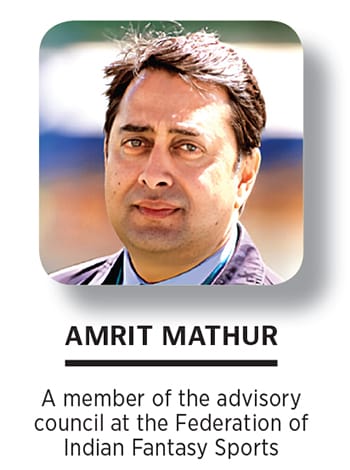
Why fantasy gaming is not gambling, by Amrit Mathur
Digital sports engagement platforms are based on legitimate sporting events, and participation of users is possible only in real time, the Federation of Indian Fantasy Sports writes
 It is important to distinguish fantasy sports from online gambling. Technically, fantasy sports are digital sports engagement platforms based on legitimate and approved sports events streaming live in compliance with their respective sporting bodies
Illustration: Samaeer Pawar
It is important to distinguish fantasy sports from online gambling. Technically, fantasy sports are digital sports engagement platforms based on legitimate and approved sports events streaming live in compliance with their respective sporting bodies
Illustration: Samaeer Pawar

There are over 13 crore users playing on more than 200 platforms—a phrase one would have often heard while reading articles or indulging in conversations centred around fantasy sports. However, whether fantasy sports qualify as games of ‘skill’ or ‘chance’ is a question of ambiguity influencing the legal status of fantasy sports platforms as part of the larger spectrum of online gaming. To clear the air, one may confidently establish that fantasy sports platforms are also recognised by the Supreme Court, having reaffirmed the decisions of three different High Courts that nullified laws banning fantasy sports under the pretext of gambling or betting. Article 19 (1)(g) offers protection to fantasy sports as a legitimised business activity.
India has made significant inroads ascertaining fantasy sports to become the largest fantasy sports market in the world, surpassing the US’s 50-plus-year-old fantasy sports market. Fantasy sports companies have begun to make a mark, for instance, by sponsoring the Indian Premier League (IPL), the Indian Olympic team in 2020, and the Commonwealth Games in 2022. Therefore, if all stakeholders come to a consensus and make a determined effort, this sunrise sector promises to emerge as an exemplary model on the world stage as an ‘Atmanirbhar’ initiative in Digital India, quite literally. It is an opportunity for India to stand out on a world platform and display its soft power.
It is important to distinguish fantasy sports from online gambling. Technically, fantasy sports are digital sports engagement platforms based on legitimate and approved sports events streaming live in compliance with their respective sporting bodies. Participation by users is possible only in real time simultaneously with an ongoing sports event, as opposed to online gambling that is accessible ad hoc and has a totally different framework where one plays and ‘bets’ on the basis of ‘luck by chance’. In fantasy sports, winning is a summation of the participant’s intelligence, analytical abilities as per ground reality and awareness of the sport, and not mere trial and error that could lead to either victory or doom.
Over the years, fantasy sports platforms have increased in popularity among Indians by bringing global sports to people’s fingertips via digital smartphone penetration and low data rates. While cricket served as the backbone for the establishment of fantasy sports, it also exposed the untapped potential of other underserved sports such as volleyball, football, kabaddi and hockey, thereby diversifying to build new audiences for India’s sports ecosystem.



 Beyond its contributions to the economy, the fantasy sports sector has also created a myriad of job opportunities for certain skilled sectors in India, ranging from software engineers and data scientists, to developers and cyber security professionals. It also welcomes the services of creative talent such as graphic and motion designers, and creative content writers. The industry is set to create up to 10,000-15,000 direct job opportunities for such skilled workers. It clearly serves as an effective tool for cognitive development and nurturing young, enthusiastic professionals.
Beyond its contributions to the economy, the fantasy sports sector has also created a myriad of job opportunities for certain skilled sectors in India, ranging from software engineers and data scientists, to developers and cyber security professionals. It also welcomes the services of creative talent such as graphic and motion designers, and creative content writers. The industry is set to create up to 10,000-15,000 direct job opportunities for such skilled workers. It clearly serves as an effective tool for cognitive development and nurturing young, enthusiastic professionals. 



